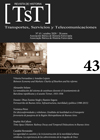Summary - TST 43
TRANSPORTES, SERVICIOS Y TELECOMUNICACIONES

Time-Space Dilation: Railway Decay and Temporal Dislocations in Buenos Aires
[Download the complete article in pdf format]
<<< SUMMARY TST 43
[ Abstract ]
Argentina has the largest railroad network in Latin America,
encompassing over 30,000 km of tracks. In a process sometimes
referred to as “ferricide,” the killing of the national railroad
system, by the mid-1990s most railroad branches and workshops in
the interior had been closed down, workers laid off, and freight
and passenger lines privatized. In the city and province of
Buenos Aires, metropolitan and interurban trains continued to
offer an affordable, if increasingly precarious, means of daily
mobility. Drawing from ethnographic research in Buenos Aires,
including participant observation onboard trains and in train
stations, railroad clubs, museums, and repair workshops, as well
as interviews with commuters, activists, railroad workers, and
train enthusiasts (ferroaficionados), this article tells the
story of railway privatization through the lens of temporality.
It charts how shifting management and repair practices, and
concomitant infrastructural decay, wrought temporal dislocations
for commuters and workers. It examines, too, mobility along a
forgotten branch of an infamous, accident-prone railroad line:
the Merlo-Lobos branch, which connects suburban Buenos Aires to
a touristic town in the rich agricultural plains of Buenos
Aires, and is served sporadically by aging diesel trains. Here,
remoteness results not from physical distance to urban centers,
but rather from the temporal dislocations produced by unreliable
transport. This article illustrates the relevance of paying
ethnographic attention to the materiality of transport
infrastructure and suggests that the histories etched into
material surfaces and structures shape the experience and very
possibility of mobility.